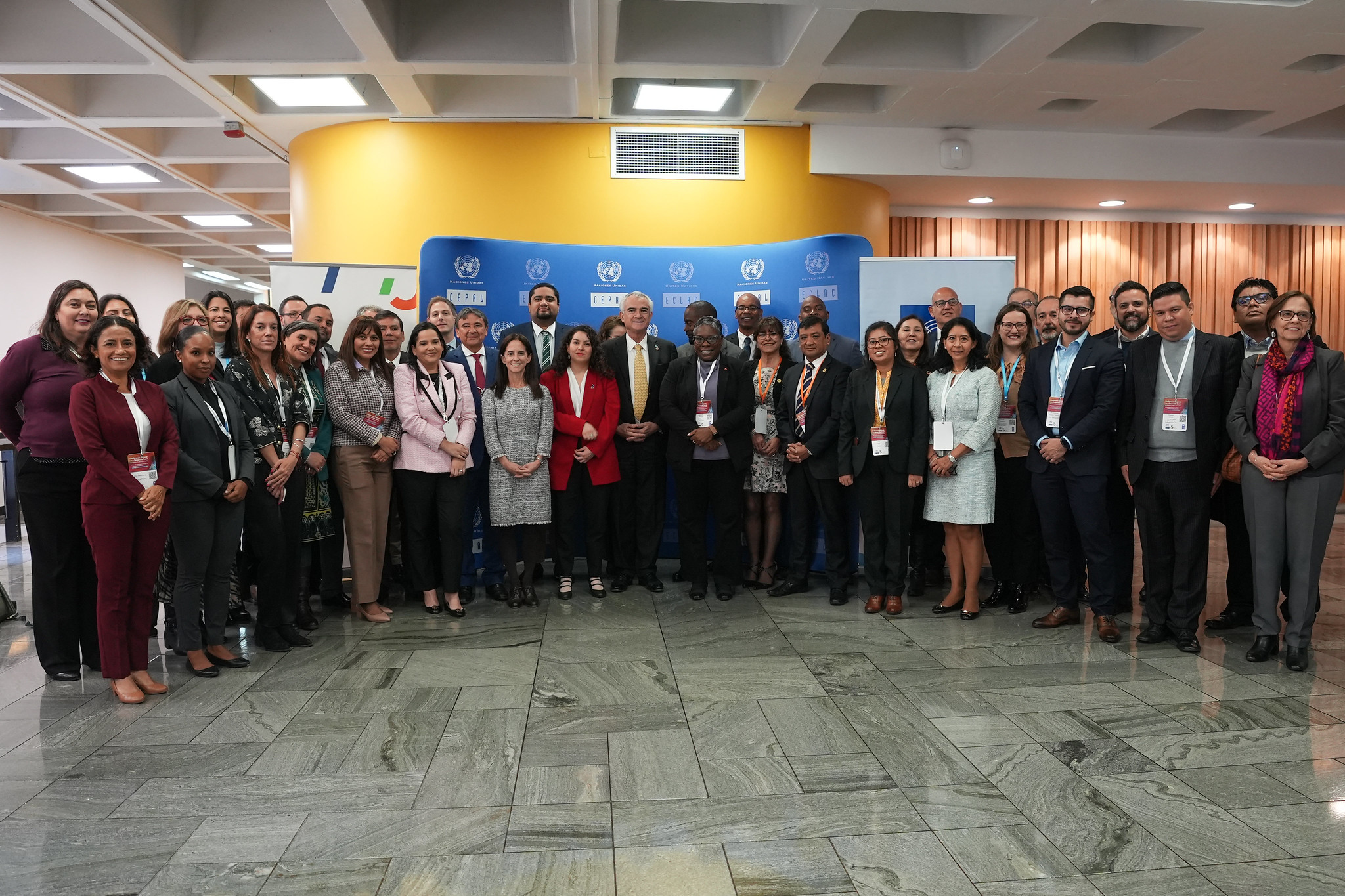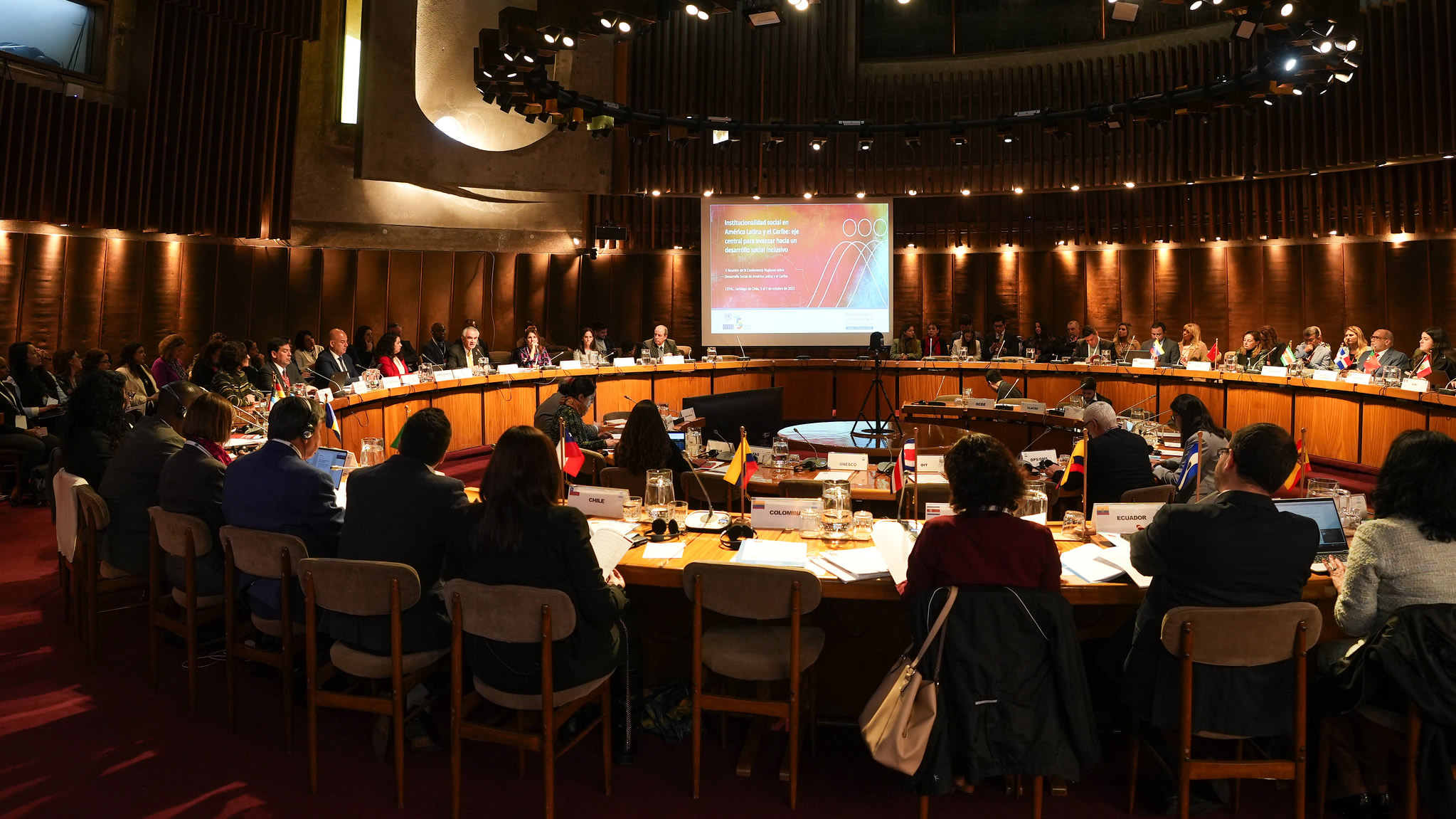A renewed commitment to inclusive social development in the region moving towards the next World Social Summit in 2025
Work area(s)
The Fifth session of the Regional Conference on Social Development in Latin America and the Caribbean and the XV Ministerial Forum for Development in Latin America concluded with the ambition of strengthening the institutional framework of social policies and looking to the future.

Countries reaffirmed the importance of placing people and their rights at the center of development, safeguarding the advances in inclusive social development achieved by the region through adequate social investment and halting the setbacks caused by the HIV/AIDS pandemic and the cascading crises.
Since 2015, the Regional Conference on Social Development in Latin America and the Caribbean has been held every two years, bringing together the Ministries of Social Development and other similar entities in the region. Its goal is to promote the improvement of national social development policies and foster international, regional and bilateral cooperation in the social sphere. The conference focuses on examining multidimensional poverty and advancing the measurement of poverty, inequality and structural gaps. The forum has generated a platform for cooperation, analysis and discussion on the strengthening of social policies and social protection systems, including the development of the Observatory on Social Development in Latin America and the Caribbean and the approval in 2019 of the Regional Agenda for Inclusive Social Development (ARDSI). This agenda includes axes and lines of action to advance the achievement of the SDGs in the region and, proposes a strengthened social institutional framework to implement quality social policies.
The Fifth session of the Regional Conference focused on strengthening the institutional framework of social policies and was attended by 108 delegates from 18 countries, as well as representatives of United Nations agencies, financial institutions, development banks and cooperation agencies, civil society and academia. The starting point for the discussion was the position paper Institutional Frameworks for Social Policy in Latin America and the Caribbean: a Central Element in Advancing towards Inclusive Social Development presented by ECLAC, which proposes 12 guidelines for strengthening social institutionality in its four dimensions and especially in the case of the Ministries of Social Development in the region. The guidelines are based on an analysis of the current situation in the countries and comparative experiences, to define ways to strengthen capacities and, thus, improve the quality of social development policies. Throughout the discussions, the countries agreed that to make progress in eradicating poverty and reducing inequality in the region, it is essential to have a robust social institutional framework to address emerging challenges, as well as transparent governance of social policy decision-making processes.
Resolution 5(V) adopted by the countries at the meeting, reiterated the importance of the institutional framework of social policies and governance. It emphasized the urgent need to enhance the four dimensions of social policy institutions: legal, regulatory, organizational, technical, operational and financial dimensions. This is essential for developing public policies that are effective, efficient, transparent and sustainable. The resolution also urged the countries to join forces to strengthen these institutions collaboratively.
With the conviction that multilateralism and cooperation are fundamental means to advance in the implementation of the 2030 Agenda for Sustainable Development, the Resolution requests technical assistance from ECLAC in the process of setting up working groups. This includes one on social registries for the exchange of good practices related to the levels of coverage, interoperability and data governance, training of competencies in this area, and quality and use of information.
Looking ahead, ECLAC was tasked to prepare a roadmap proposal and a document for consideration at the next Meeting of the Sixth Meeting of the Presiding Officers of the Conference in 2024 under the auspices of the Government of Barbados to bring the region's voice to the World Social Summit to be held in 2025. In turn, the Government of Brazil offered to host the Sixth Meeting of the Regional Conference on Social Development in Latin America and the Caribbean in 2025.
Related content

Fifth session of the Regional Conference on Social Development in Latin America and the Caribbean
The Fifth session of the Regional Conference on Social Development in Latin America and the Caribbean of ECLAC and the XV Ministerial Forum for Development in Latin America and the Caribbean of UNDP,…

The Region’s Countries Reaffirmed the Importance of Safeguarding Progress on Inclusive Social Development and Halting the Setbacks Prompted by Cascading Crises
Today marked the conclusion of the Fifth Session of the Regional Conference on Social Development in Latin America and the Caribbean and the XV Ministerial Forum for Development in Latin America and…

Strengthening the Social Institutional Framework and Governance is Fundamental for Making Progress on Eradicating Poverty and Reducing Inequality in the Region
The Fifth Session of the Regional Conference on Social Development in Latin America and the Caribbean – organized by ECLAC, the Government of Chile and the UNDP – was inaugurated today in Santiago,…

Social Development Authorities from Latin America and the Caribbean Will Meet on October 3-5 in Chile
The Fifth Session of the Regional Conference on Social Development in Latin America and the Caribbean – organized by ECLAC, the Government of Chile and the UNDP – will be centered on strengthening…
Country(ies)
- Latin America and the Caribbean
